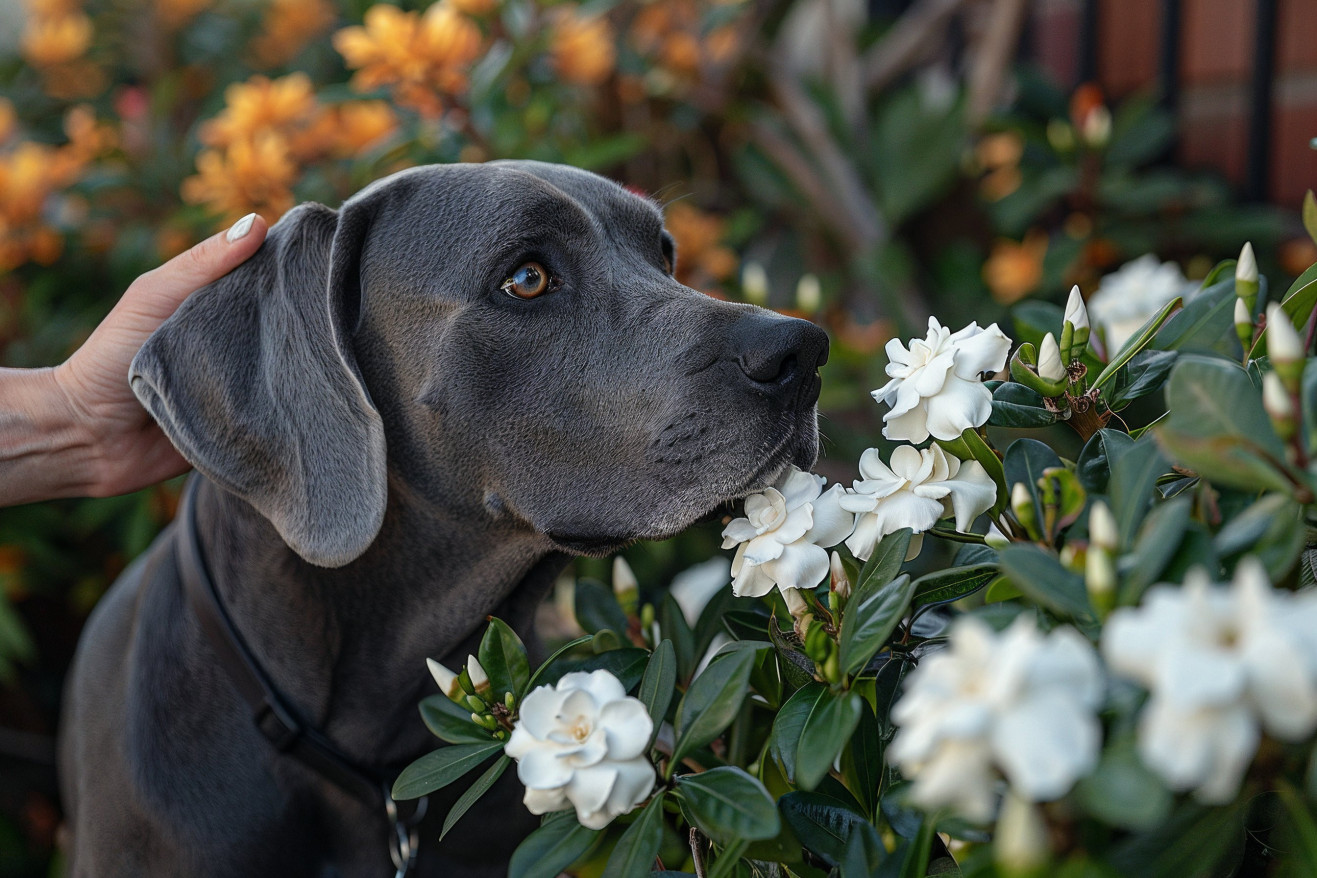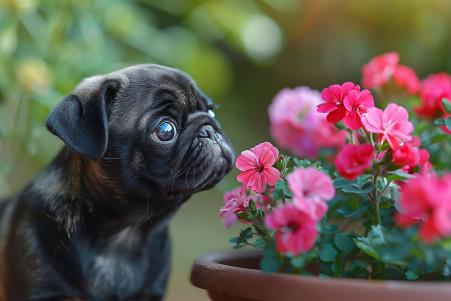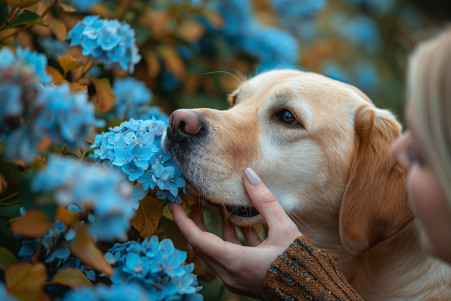Can Dogs Eat Gardenias? Important Information About Gardenia Toxicity
27 May 2024 • Updated 27 May 2024

Gardenias are a lovely addition to any garden, but are the flowers and leaves of the gardenia plant poisonous to dogs? They sure are. The gardenia plant is toxic to dogs. In fact, every part of the gardenia plant, from the flowers to the leaves, stems, and buds, contains toxic substances such as gelsemine, neriine and other alkaloids that can lead to symptoms such as vomiting, diarrhea, incoordination, and even abnormal heart rate and low blood pressure if consumed by dogs.
To help you better understand the dangers of gardenias and how to keep your dog safe, we've looked at the latest research from veterinary toxicology experts and pet poison control hotlines. These experts have carefully detailed case reports and symptoms associated with gardenia plant exposure in dogs. We've also explored the toxic substances found in these plants to find out exactly how they impact a dog's internal systems. With this information, you'll be able to take the necessary precautions and know what to do if you suspect your dog has been poisoned by gardenias.
Are gardenias poisonous to dogs?
Gardenia Toxicity: What Are the Dangers?
Every part of the gardenia plant, from the sweet-smelling flowers to the glossy leaves, woody stems, and colorful berries, contains toxic compounds that are dangerous to dogs. The main toxic chemicals in gardenias are geniposide, gardenoside, and other alkaloids like gelsemine and neriine, says the ASPCA. These chemicals can cause gastrointestinal upset, including vomiting and diarrhea. However, their impact isn't limited to the digestive tract - they can also affect the cardiovascular and nervous systems.
Although gardenia poisoning is rarely fatal, the severity of the poisoning depends on the amount of the plant that's eaten and the size and health of the dog. For example, a large, healthy dog may only experience mild symptoms after eating a small amount of the plant. On the other hand, a small puppy or toy breed dog may eat a few leaves or flowers and experience severe symptoms that require veterinary care to treat the poisoning.
Despite the fact that these popular ornamental plants are a lovely addition to gardens, they can be dangerous to our furry friends. Knowing what the dangers are enables dog owners to protect their pets and seek help if their dog eats any part of the plant.
How to Tell If Your Dog Has Eaten Gardenia
The Gardenia 'Florida' Is Toxic To Dogs report lists some of the most common signs of gardenia poisoning in dogs, which include vomiting, diarrhea, lethargy, anorexia, and abdominal pain. More severe symptoms can include drooling, tremors, ataxia, seizures, and dyspnea. The BeChewy article explains that these symptoms will usually occur within 1-2 hours of ingestion, although there can be a delayed reaction. The Poisoning: First Aid and After Care for Your Dog guide also notes that the severity of the symptoms will depend on the amount of plant material ingested and the size of the dog.
If you suspect that your dog has ingested gardenia, it's important to seek immediate help, as the Gardenia 'Florida' Is Toxic To Dogs report explains. Quick medical attention is needed to help manage the toxic effects and avoid any potential complications.
Emergency Response: First Aid for Gardenia Poisoning
If you think your dog has eaten gardenia, the Puppy Tales guide suggests calling a vet or pet poison control hotline immediately. You should have information about the plant, how much your dog ate, and any symptoms they may be experiencing ready. The vet may ask you to induce vomiting or give the dog activated charcoal, as mentioned in the HowStuffWorks article. However, you should never induce vomiting unless a vet tells you to, especially if your dog is having seizures or is unconscious.
You should get your dog to a vet right away, especially if you notice severe symptoms or if your dog's symptoms seem to be getting worse, according to the American Kennel Club. It's important to follow your vet's advice and make sure your dog gets the care they need as soon as possible to help manage the effects of gardenia poisoning and avoid any potential issues.
Veterinary Care and Monitoring of Gardenia Poisoning
Veterinary care for dogs that have eaten gardenia plants may include vomiting induction, activated charcoal, or gastric lavage, according to the How to Treat Poisoning in Dogs | Pet First Aid guide. Supportive care, including IV fluids, antihistamines, and gastro-protective medications, may also be given to help with the toxic effects, as mentioned in the Gardenia Volkensii Is Toxic To Dogs 🐶 report.
Blood work and monitoring may be needed to check organ function and electrolyte balance, according to the Gardenia Volkensii Is Toxic To Dogs 🐶 report. In more serious instances, hospitalization and monitoring may be required to watch for complications. After the dog has been treated, the vet may recommend check-ups and changes to the dog's diet to ensure that they stay healthy and don't have another incident.
Safer Options: Dog-Safe Plants That Resemble Gardenias
According to Tahitian Gardenia is Not Toxic to Dogs 🐶, the Tahitian Gardenia is a dog-safe alternative to the gardenia plant. Other dog-friendly flowering plants include camellias, fuchsias, magnolia shrubs, and coral bells, which are listed in the Dog-Safe Plants | 15 Plants That Work for Your Dog and Garden post.
In addition to checking a plant’s toxicity, it's important to make sure that you're looking at reputable sources for information on pet safety, as noted in the Beautiful Pet-Safe Flowers for Your Garden and Home article. You can also use physical barriers or deterrents to keep dogs away from plants that may be toxic. If your dog is a plant chewer, it's also a good idea to make sure they see a vet regularly to ensure that they're healthy and safe.
By considering these safer options and taking other precautions, dog owners can enjoy the beauty of flowering plants without worrying about gardenia poisoning.
Conclusion: Making Sure Your Pets Are Safe in the Garden
Gardenias are a real danger to dogs because of their poisonous chemicals. The ASPCA explains that all parts of the gardenia plant, including the flowers, leaves, stems, and berries, contain toxic compounds such as geniposide, gardenoside, and other alkaloids that can cause vomiting, diarrhea, and even impact a dog's cardiovascular and nervous systems.
Prompt veterinary attention is crucial if gardenia ingestion is suspected. As the Puppy Tales guide explains, pet parents should call a vet or pet poison control hotline immediately and then do exactly as they're told, which may include inducing vomiting or giving the dog activated charcoal. The HowStuffWorks article warns against doing either of these things without consulting a professional first.
Following first aid guidelines and seeking professional advice can improve the outcome. Choosing pet-friendly alternatives and implementing preventative measures can ensure a safe environment. The Tahitian Gardenia is Not Toxic to Dogs report points out the Tahitian Gardenia as a non-toxic alternative, while the Rover.com article lists other dog-safe flowering plants like camellias and fuchsias. Regular monitoring and education are key to maintaining a harmonious relationship between pets and plants.


